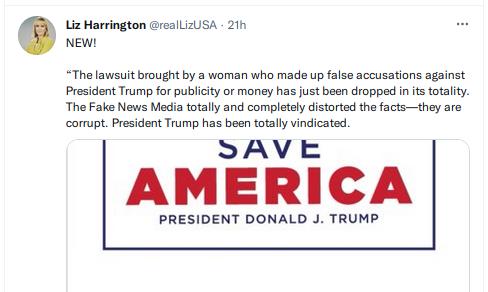
A recent article in Business Insider does much to betray the moral panic that has characterized media coverage of Donald Trump since that fateful day in 2015 when he announced his candidacy.
In his November 13 piece, Trump took a victory lap after a woman who accused him of sexual assault dropped her defamation lawsuit against him, Thomas Colson writes in response to a statement by Trump spokesperson Liz Harrington in the wake of former The Apprentice contestant Summer Zervos having dropped her defamation suit against Trump:
The trick Colson is playing here is in implying that innocence is something that needs to be proven, when in reality the onus is always on the accuser to prove the defendant’s guilt in the court room. Even if a trial concludes in a defendant’s favor, they’re never proven innocent, but rather they are found not guilty, and continue to be presumed innocent in the eyes of the law. As far as I know, it is never a court’s duty to vindicate anyone, but rather to determine whether guilt can be shown beyond a shadow of reasonable doubt.
As for whether or not Trump has been “totally vindicated” in any actual sense (legal or otherwise), consider that his accuser waited until the statute of limitations had elapsed before going public in 2016 with her allegations of sexual assaults that supposedly occurred in 2007. Assuming for a moment that Zervos’ allegations of sexual assault are valid, then she would have put other women at risk of sexual assault by keeping her accusations to herself until nine years later, when the allegations could earn her that much more publicity and potentially affect the outcome of a presidential election. If her allegations are true, by default she would have made herself a potential accomplice to further sexual assaults by her silence.
(Even genuine victims of sexual assault aren’t exempt from personal accountability and civic duty, however anathema such a notion may seem to those who subscribe to “social justice”.)
But the fact remains that if her allegations are true, then Zervos evaded her duty to society, and her fellow women, by not reporting the supposed sexual assaults at the time, and by not allowing the alleged incidents to be properly investigated by the authorities, and/or tested in court. (Likewise for people like E. Jean Carroll and Christina Blasey-Ford, both of whom also waited decades to go public with allegations that, on the face of it, appear to have been made for the purpose of disrupting a political or judicial process, rather than in the interest of justice of any kind. They, like Zervos, also would have put other women at risk by their silence if their allegations were true.)
And then there’s the defamation aspect to this whole affair. The upshot of Zervos now-dropped case against Trump was that a mere denial of an allegation, in and of itself, somehow constitutes “defamation”. To deny an allegation, by its very nature, implies either that an accuser is being untruthful — that’s not the same thing as defamation, particularly when the accuser is floating vile accusations that can no longer be tested (and thus cannot be disproven) in court. That would be like boxer challenging another boxer to match, and the suing that other boxer for physical assault for actually putting up a fight in the ring.
Huh?
On the whole, if Zervos chose not to report her sexual assaults before the statute of limitations elapsed, and then also chose to drop her defamation suit, then indeed Trump has been been “totally vindicated” by this chain of events, which is what I think Harrington was getting at.
I have no doubt that reporting a sexual assault, and then having to testify in detail about it, and withstand questions from defence attorneys, must be nothing less than excruciating and triggering for a victim, at least when their accusations are objectively true. I can’t even imagine the intestinal fortitude it takes to put oneself through such an ordeal, and conversely I can also understand why a person might opt to simply not follow through.
But as withering as it must be to follow through with a sexual assault allegation, all genuine victims of sexual assault nevertheless owe it to other potential victims to step forward and report their perpetrators to the authorities while their accusations still have legal weight, and to not wait until a moment years or decades later that appears to reek of political opportunism and, in the case of E. Jean Carroll, once they have a book to sell.
All allegations of sexual assault made within the statute of limitations should be taken seriously and investigated thoroughly. When such allegations are made outside of said statute, and especially at moments create the appearance of the allegations having been politically calculated, pointed questions deserve to be asked.
Moreover, as vile as sexual assault may be, the presumption of innocence is one of the pillars of justice, and should apply equally to everyone, and not just those who are politically fashionable.
As with allegations that are provably false, weaponizing the specter of sexual assault for political purposes, or for economic motives, such as book sales, only serves to cheapen the trauma experienced by genuine survivors, as well as make them feel that much more stigmatized for stepping forward.